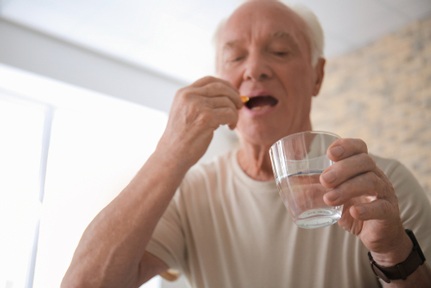Omicron: Covid pill to be given at home to treat vulnerable people before Christmas
A treatment for Covid-19 is being offered for the first time to people in their own homes before Christmas to protect the most 'vulnerable' individuals from the Omicron strain.

People at highest risk from hospitalisation or death after testing positive for Covid-19, including those who are immunocompromised, can take the antiviral drug molnupiravir or an antibody treatment called Ronapreve at home from Thursday, 16 December.
Molnupiravir has, according to clinical trials, cut by a third the risk of hospitalisation or death for at-risk people with mild to moderate COVID-19. Ronapreve has reduced the risk by 70 per cent.
The UK is the first country in the world to license molnupiravir’s use from Ridgeback Biotherapeutics and Merck Sharp & Dohme (MSD). Some 480,000 courses of molnupiravir have been secured, and it is hoped that the antiviral pill, administered at home, will reduce their symptoms and speed recovery to take the pressure of the NHS this winter.
The NHS is expected to give courses of the tablet to clinically vulnerable and immunosuppressed patients within as little as 48 hours of them testing positive for Covid. People in the highest-risk group will be notified by the NHS if they have test positive and are eligible.
Omicron threat: New treatments have part to play to protect 'most vulnerable'
In the House of Commons, Health Secretary Sajid Javid announced a new national trial will give people access to molnupiravir if they are aged over 50 or have underlying health conditions.
Mr Javid told MPs “We’re working night and day to understand more about the Omicron variant.
“New laboratory data which has emerged in the last 24 hours suggests that there is lower immunity against Omicron from vaccination, when compared to the Delta variant so that two doses of a vaccine is less effective at reducing transmission in the community."
He said new treatments “have a huge part to play in protecting the most vulnerable from Covid-19, especially for those who are immunosuppressed and so vaccines may be less effective.
“Today, we’ve announced plans for thousands of people across the UK to be among the first in the world to access life-saving antivirals through a new national study.”
An Oxford University-led trial named ‘Panoramic’ aims to recruit 10,600 people to test whether Molnupiravir can reduce the need for the over 50s and those with underlying health problems to be admitted to hospital. The results of the national trial are expected early next year.

Professor Chris Whitty: Omicron’s ‘extraordinary fast rate’
England’s chief medical officer Professor Chris Whitty has warned that a rapid rise in Omicron infections could send hospitalisations in England soaring upwards in the weeks to come, with the most vulnerable at risk.
In last night’s Downing Street briefing (8 December), the public were told Omicron’s rate of infection is doubling every two days and 1 million cases of infection are expected by the end of December.
Professor Chris Whitty told the nation: "That is an extraordinarily fast rate and you, therefore, can see how we could move from very small numbers to very large numbers really quite quickly.
"That really is the reason why these measures [Plan B] have been announced by the Prime Minister as agreed by ministers today."
SAGE has warned there could be 1,000 admissions per day by the end of this month in England alone.
During the Downing Street briefing, Prime Minister Boris Johnson said tightening Covid restrictions by introducing the government’s ‘Plan B’ and a work from home rule from 13 December, could slow down the spread of infection, while more Covid booster vaccines are given to the public.
Latest News
 29-Jul-24
Dementia Bus gives carehome.co.uk staff insight into life with dementia
29-Jul-24
Dementia Bus gives carehome.co.uk staff insight into life with dementia
 27-Jul-23
UK's top home care agencies in 2023 revealed
27-Jul-23
UK's top home care agencies in 2023 revealed
 30-Nov-22
A quarter of older people keep their falls secret from family
30-Nov-22
A quarter of older people keep their falls secret from family
 29-Nov-22
'Covid-19 has not gone away' say terminally ill
29-Nov-22
'Covid-19 has not gone away' say terminally ill
 28-Nov-22
IT consultant who received poor care opens 'compassionate' home care business
28-Nov-22
IT consultant who received poor care opens 'compassionate' home care business